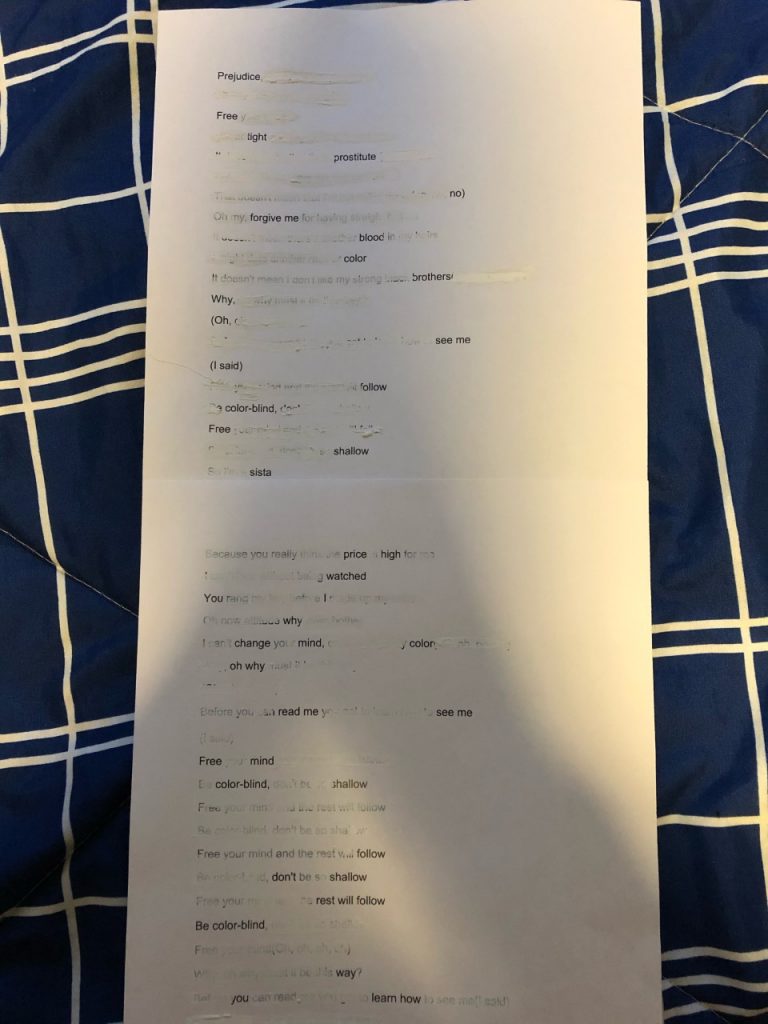The United States has become a melting pot of almost every race imaginable, yet prejudices are still present today, as they were in Lorraine Hansberry’s A Raisin In The Sun. In the 1950’s, when this was written, there were many more prejudices being thrown toward the African American race than there are today. There were separate water fountains, separate schools, and even separate bathrooms to discriminate the whites from the African Americans. At some points in time, as seen in Act 2, scene 3 of A Raisin In The Sun, there were even separate communities for the two races. When Mr. Linder comes into the Younger household and tells the family that they would be “happier when they live in their own communities.” (118). Seeing that written on the page is absolutely heartbreaking. The Younger family have been through so many hardships as a collective group, and just when they think they are getting out of the thick of it, a man comes in to tell them that they aren’t welcome in that community. Race seems to be an extremely large portion of this play’s conflicts. Thinking about the time period in which this play was written, there were not equal job opportunities for both black and white people, therefore causing the black population to struggle more and to obtain jobs that not only paid less, but sometimes didn’t even pay at all. The continuous hardships produced by race proved to be a persistent problem throughout the play.
Hansberry’s play introduced the audience to the problems that were created by racial inequality, with the Younger family being the main victims. However, there can also be a connection made between the description of the furniture and the problems of race that are so blatantly obvious. In the description of the furniture of the house, it’s stated that “…here, a table or chair has been moved to disguise the worn places in the carpet…” (23). According to the description of the furniture, there have been attempts to hide the places of the carpet that nobody wants to see. And it can be equated to the time period in which A Raisin In The Sun was written, because of things like the Jim Crow laws, and the continuation of racial segregation everywhere. The phrase “separate but equal” comes to mind. The black populous is being perceived as equal, meaning that they would have equal protection under the law and they would receive equal opportunities, but that “equality” is just a chair being pushed over a worn place in the rug. Underneath the chair, it is obvious that racial inequality is an extremely large problem being faced by the black population. Hansberry goes on to explain “… but the carpet has fought back by showing it’s weariness, with depressing uniformity, elsewhere on its surface.” (23). While the racial inequality is trying to be covered up with “equal opportunities” and “equal protection” it is still showing up in many other aspects. Some of the aspects that were obvious were the unacceptance of black people in white communities, as explained by Karl Linder by stating “…our Negro families are happier when they live in their own communities.” (118). He goes on to exclaim “What do you think you are going to gain by moving into a neighborhood where you just aren’t wanted and where some elements-well-people can get awful worked up when they feel that their whole way of life and everything they’ve ever worked for is threatened.” (119). Obviously there are still many biases based on race being conveyed. In this case, it is being shown through the use of community backgrounds, stating that if they’re African American, they should be with other African Americans, and that they are not welcome in white communities. It’s crazy to think that just by saying these people are equal that it doesn’t have to be acted on.
Discussion Questions:
- How else could the Jim Crow laws and segregation affect the Younger family?
- Do you think Travis understands what is going on around him regarding all of the prejudice that follows the Younger family? How would Travis handle finding out his family are constantly being seen as inferior?
Thanks for reading! This was made by Chris Feustel (:

